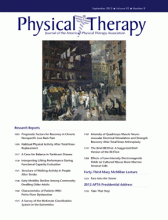Abstract
Background Pelvic-floor dysfunction (PFD) affects a substantial proportion of individuals, especially women.
Objective The purposes of this study were: (1) to describe the characteristics of individuals with disorders associated with PFD who were seeking outpatient physical therapy services and (2) to identify the prevalence of specific pelvic-floor disorders in the group.
Design This was a prospective, longitudinal, cohort study of 2,452 patients (mean age=50 years, SD=16, range=18–91) being treated in 109 outpatient physical therapy clinics in 26 states (United States) for their PFD.
Methods This study examined patient demographic variables and summarized patient self-reported responses to questions related to urinary and bowel functioning at admission prior to receiving the therapy for their PFD disorders.
Results Patients primarily were female (92%), were under 65 years of age (39%: 18 to <45 years; 39%: 45 to <65 years; 21%: 65 years or older), and had chronic symptoms (74%). Overall, 67% of the patients reported that they had urinary problems, 27% reported bowel problems, and 39% had pelvic pain. Among those who had urinary or bowel disorders, 32% and 54% reported leakage and constipation, respectively, as their only problem. Among patients who had pelvic pain, most (56%) reported that the pain was in the abdominal area. Combinations of urinary, bowel, or pelvic-floor pain disorders occurred in 31% of the patients.
Limitations Because this study was a secondary analysis of data collected prospectively, the researchers were not in control of the data collection procedure. Missing data were common.
Conclusions Data suggested most patients with PFD receiving outpatient physical therapy services were female, younger than 65 years, and had disorders lasting for more than 90 days. Combinations of urinary, bowel, or pelvic-floor pain disorders were not uncommon.
Footnotes
Dr Wang and Dr Hart provided concept, idea, research design, and writing. Mr Mioduski provided data collection and participants. Dr Hart and Mr Mioduski provided project management. Dr Hart provided consultation (including review of the manuscript before submission).
This project was approved by the institutional review boards for the protection of human subjects from Focus On Therapeutic Outcomes, Inc, and the University of Wisconsin–Milwaukee.
Dr Wang acknowledges that she is an employee of Focus On Therapeutic Outcomes, Inc (FOTO), the database management company that manages the data analyzed in the study. Analyses of data such as those presented in the report are part of Dr Wang's regular daily work activities. Dr Hart and Mr Mioduski are employees of FOTO. Dr Hart guided many of the analyses and edited the manuscript, activities that are part of his daily work activities. Mr Mioduski programmed the software that was used to develop the computerized adaptive tests (CATs), programmed the software that was used to collect the data, and managed the data from the CATs once collected. These activities are part of Mr Mioduski's regular daily work activities.
- Received August 23, 2011.
- Accepted March 19, 2012.












